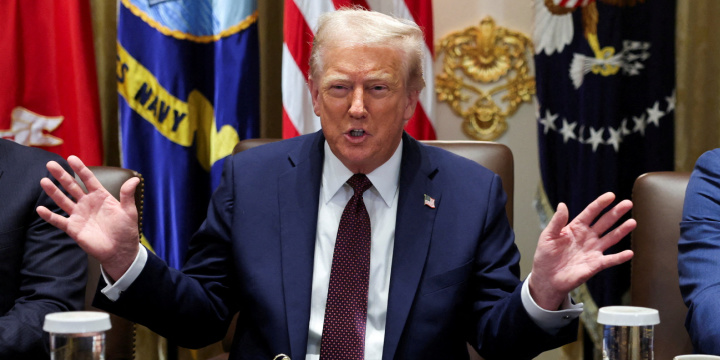US President Donald Trump gestures during a cabinet meeting at the White House in Washington, DC, US, Aug. 26, 2025. Photo: Jonathan Ernst via Reuters Connect
US President Donald Trump has said that Harvard University must pay a minimum $500 million penalty as part of a settlement to restore $3 billion in federal contracts and research grants his administration impounded from the school’s coffers earlier this year.
Trump insisted on “nothing less” in remarks to Education Secretary Linda McMahon during a cabinet meeting held on Tuesday. “They’ve been very bad. Don’t negotiate,” he added.
The comments came just two and a half months after McMahon, representing the Trump administration, hinted at the possibility of reaching a deal with Harvard and unfreezing the federal funds. Speaking to Bloomberg, the education secretary said that Harvard was “making progress” and “already put in place some of the things that we have talked about in our negotiations with Columbia” University, which included some wish-list reforms for which conservatives have spent decades advocating.
At the time, Harvard had filed suit against the administration, seeking a summary judgement which ruled that the funds confiscation was arbitrary and skipped key steps the government must take before taking such an action. The New York Times reported that Harvard expressed interest in paying $500 million to settle the matter, and university officials had begun dismantling initiatives and making other changes to reverse an impression that the institution is doctrinally far left and anti-Zionist.
In July, it announced new partnerships with Israeli academic institutions and shuttered its diversity, equity, and inclusion (DEI) offices, transferring their staff to other sections of the university. These moves came after it “paused” a partnership in March with a higher education institution located in the West Bank. Some reports, according to the Harvard Crimson, even suggested that Harvard is willing to found a “new conservative research institute.”
However, Harvard university’s president, Alan Garber, deluged by inquiries from Harvard faculty outraged at the prospect of settling with the Trump administration, later proclaimed that the Times had reported fake news and that he intended to continue on fighting the government in court.
“In a conversation with one faculty member, [he] said that the suggestion that Harvard was open to paying $500 million is ‘false’ and claimed that the figure was apparently leaked to the press by White House officials,” the Harvard Crimson reported, noting that the Times had defended the veracity of its report. “In any discussions, Garber reportedly said, the university is treating academic freedom as nonnegotiable.”
The conflicting headlines highlighted the competing objectives Garber is being forced to choose between — rescuing Harvard from a perilous fiscal situation or placating its left-leaning faculty, 94 percent of whom donated to Democratic candidates in 2024, as reported by the Crimson.
In July, a Crimson poll of over 1,400 Harvard faculty revealed that 71 percent of arts and sciences faculty oppose negotiating a settlement with the administration and 64 percent “strongly disagree” with shuttering DEI programs. Additionally, 73 percent oppose rejecting foreign applicants who hold anti-American beliefs which are “hostile to the American values and institutions inscribed in the US Constitution and Declaration of Independence,” and 70 percent strongly disagree with revoking institutional recognition from pro-Hamas groups such as the Palestine Solidarity Committee (PSC).
“More than 98 percent of faculty who responded to the survey supported the university’s decision to sue the White House,” The Crimson reported. “The same percentage backed Harvard’s public rejection of the sweeping conditions that the administration set for maintaining the funds — terms that included external audits of Harvard’s hiring practices and the disciplining of student protesters.”
At the same time, Harvard will see annual budget shortfalls of $1 billion if the if the Trump confiscations remain in effect, according to the Wall Street Journal, a loss the university is offsetting by enacting “contingency preparations” predicated on amassing $1 billion in debt with help from Goldman Sachs and Morgan Stanley. Analysts have told The Algemeiner that Harvard’s immense wealth, powered by a $53 billion endowment valued higher than the gross domestic product of countries such the Kingdom of Bahrain and Bolivia, can sustain its borrowing in the short term but not in perpetuity.
“If Harvard is willing to mortgage its real estate or use it as collateral, it can borrow money for a very long time,” National Association of Scholars president Peter Wood told The Algemeiner in April. “But it could destroy itself that way.”
On Friday, Asaf Romirowsky, a Middle East expert and president of Scholars for Peace in the Middle East (SPME), said Harvard should make a deal, arguing that would be in the interest of both the school and the country.
“Universities have begun to rapidly adapt to the new realities. One change being made by universities is increased hiring of Title VI coordinators to handle civil rights complaints,” he said. “Beyond the cosmetic, the US desperately needs to reevaluate what a university is and what it is for. Five decades of universities striving for relevance has had the effect of politicizing the humanities and social sciences.”
He continued, “As faculties have become politically monolithic, students interested in exploring traditions and themselves have been alienated, causing a feedback loop of shrinking disciplines and intensifying politics.”
Follow Dion J. Pierre @DionJPierre.
Click this link for the original source of this article.
Author: Dion J. Pierre
This content is courtesy of, and owned and copyrighted by, https://www.algemeiner.com and its author. This content is made available by use of the public RSS feed offered by the host site and is used for educational purposes only. If you are the author or represent the host site and would like this content removed now and in the future, please contact USSANews.com using the email address in the Contact page found in the website menu.





